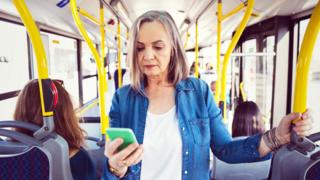 Image copyright
Getty Images
Image copyright
Getty Images
People who have been in close contact with someone found to have Covid-19 are now being traced.
The NHS contact tracers will ask people they get in touch with to self-isolate for a fortnight. An app is also being developed, although its launch has been delayed.
How does contact tracing work in England?
The hope is that contact tracing will avoid the need for national lockdowns, with more local restrictions used instead.
Anyone in England with coronavirus symptoms can now get a test. If it's positive you'll be contacted by text, email or phone and asked to log on to the NHS Test and Trace website.
There you will be asked for personal information including:
- Name, date of birth and postcode
- Who you live with
- Places you visited recently
- Names and contact details of people you have been in close contact with in the 48 hours before your symptoms started
Close contacts are:
- people you spend 15 minutes or more with at a distance of less than 2m
- people you have direct contact with - such as sexual partners, household members or people with whom you have had face-to-face conversations at a distance of less than 1m
The contact must have taken place between two days before and up to seven days after symptoms appeared.
No-one contacted as a result of you testing positive for coronavirus will be told your identity.
A parent or guardian will need to give permission for a call with under-18s to continue.
Manual tracing was meant to be launched in mid-May, in tandem with an app that would automatically alert users if they have been in contact with another user with coronavirus.
The manual element launched in England on 28 May. The app is still being trialled on the Isle of Wight and hasn't been released more widely, although business minister Nadhim Zahawi suggested it would be in place by the end of June.
What about other parts of the UK?
Northern Ireland was the first of the four UK administrations to bring in contact tracing, which is being carried out exclusively by telephone at the moment.
Scotland's system is called NHS Test and Protect, with 700 contract tracers at the moment - increasing to 2,000 later. It was launched as the easing of lockdown restrictions began.
In Wales, the ''test, trace, protect'' system launched on 1 June.
What if I am contacted by the tracers?
Anyone deemed at risk of infection will be told to stay at home for 14 days.
You will be asked to self-isolate, even if you do not have symptoms, to stop the danger of the virus spreading.
You should not leave your home for any reason. If you need food or medicine and live alone, you should order it online or by phone, or ask friends and family to drop it off on your doorstep.
If you live with other people they won't have to self-isolate, unless they also develop symptoms, but they must take extra care around you regarding social distancing and hand washing.
How is the tracing scheme going?
Not enough people with coronavirus symptoms are ordering a test, says Baroness Dido Harding, who is leading England's track and trace system.
Prime Minister Boris Johnson said England's tracing system would be "world-beating". But a report from Channel 4 News said in the first few days of operation only a small number of contacts had been traced.
It's understood that between 28-30 May, just over 1,800 coronavirus sufferers had registered contacts online or by phone - and of the 4,600 people they'd been close to, only 1,750 were contacted by tracers.
On 3 June, the government said it would be providing weekly updates ''shortly''.
Health Secretary Matt Hancock says ''thousands of people are being contacted'' and that the government won't publish details until the statistics authority is happy about how they are measured.
How do I avoid scammers?
The NHS Test and Trace service will not ask you:
- for bank details, or payments
- for details of any other accounts, such as social media
- to set up a password or PIN number over the phone
- to call a premium rate number, such as those starting 09 or 087
England's Health Secretary Matt Hancock says the tracers will only be calling from 0300 0135 000.

Do I have to follow the instruction to self-isolate?
It's currently voluntary, but the Department for Health has said that if people don't comply "we will not hesitate to introduce tougher measures, for example making visits to check they're home or issuing fines if they are found outside the house".
What about sick pay?
If people can't work from home, the government says employers must ensure any self-isolating employee is receiving sick pay and give them the option to use their paid leave days if they prefer.
Statutory Sick Pay (SSP) is £95.85 per week and paid by your employer for every day you are in isolation, as long as you meet the eligibility conditions.
Some have expressed fears that many workers will not be able to live on that amount and will keep working.